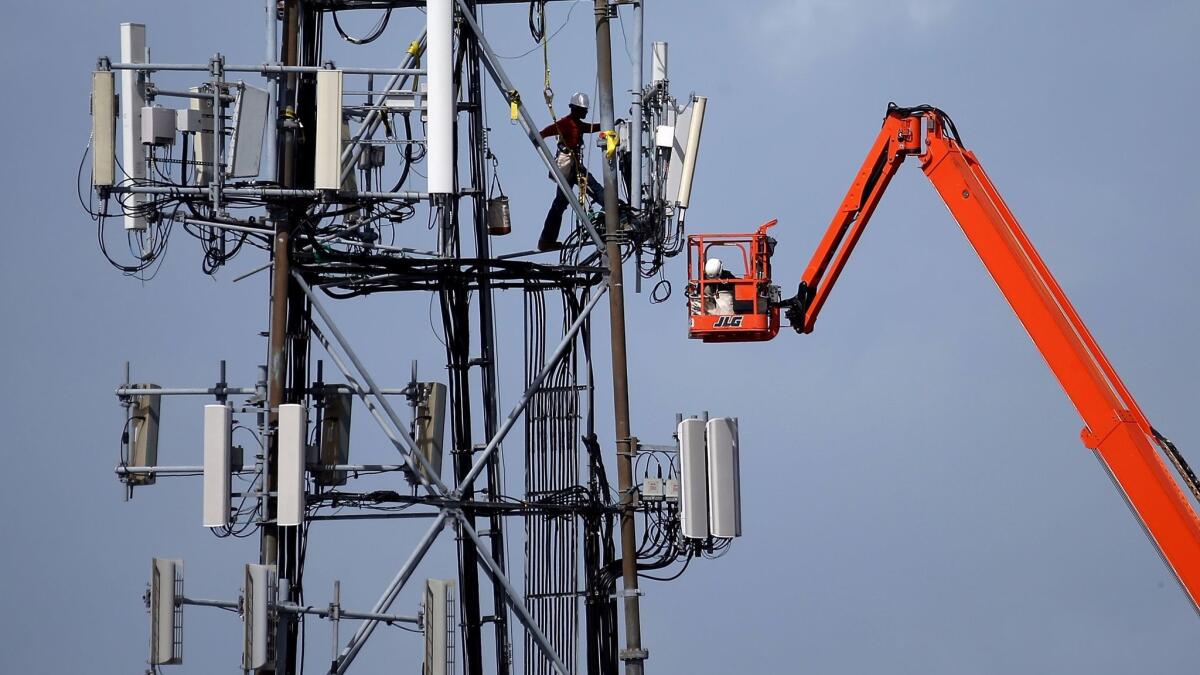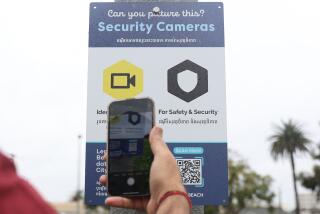Supreme Court weighs privacy for cellphone records: Can police track a suspect’s travels?

Reporting from Washington — The Supreme Court weighed privacy rights in the digital era Wednesday, confronting the question of whether the police can obtain a suspect’s cellphone records to track his travels for four months without a search warrant.
The answer appeared to be: No.
During an intense oral argument, the nine justices sounded divided along unusual lines, but most appeared to agree that collecting cell tower data to track a suspect’s movements for 127 days amounted to an unreasonable search.
It was unclear whether they would decide simply to limit how long the police may track a suspect through his mobile phone, or instead rule broadly that cellphone records are private and off limits to the police or the FBI without a search warrant.
That would amount to a major change in the law, the government told the court, and one that could hamper investigations when police do not know who committed a murder, robbed a bank, abducted a child or set off a bomb.
In those cases, investigators often obtain data from cellphone towers to narrow the list of people who were nearby when the crime was committed. They would not have “probable cause” to obtain a warrant for a particular suspect and his cellphone.
By contrast, the case heard Wednesday began when police learned that Timothy Carpenter was the leader of a robbery ring in Detroit. Several of his cohorts had confessed.
To build their case, prosecutors obtained a magistrate’s order requiring several wireless carriers to turn over records of 16 phone numbers that Carpenter had used over four months. The data confirmed he was nearby when his accomplices carried out eight robberies of Radio Shack stores. He was convicted and sentenced to 116 years in prison.
Under current federal law, the prosecutor has to show the magistrate only that the cellphone records are “relevant and material to an ongoing criminal investigation.”
In his appeal, ACLU lawyer Nathan Wessler urged the court to set a higher standard and to require prosecutors to show “probable cause” that the suspect was engaged in crime.
He described cellphones as a “kind of time machine” that allows police and prosecutors to track a suspect’s movements over a long period.
His argument focused on the length of the tracking. He urged the court to set a one-day limit for cellphone records.
How about “the day of each robbery?” asked Justice Ruth Bader Ginsburg. There were eight robberies. “Why wouldn’t it be equally reasonable for each robbery?” she asked.
Justice Sonia Sotomayor asked about a crime such as a bank robbery. “Could the police just get a tower dump of the cell site to see who was in the area at that time?”
Yes, Wessler said. “I think that would not be affected at all by this case. That would be quite short term.”
Justices Samuel A. Alito and Anthony M. Kennedy were the most skeptical of the ACLU’s argument.
In the past, the court said police needed a search warrant before they listened to a suspect’s phone calls or, more recently, downloaded digital contents of a smartphone. Those involve private information protected by the 4th Amendment.
But the court said investigators may obtain bank records and phone records without a search warrant because customers knowingly made calls or wrote checks and because the records were held by a private company, not the government. Alito said he did not see a need to change that framework.
“Why is cell site location information more sensitive than bank records?” he asked.
Wessler said charting a “minute-by-minute account of a person’s location” reveals more sensitive information than checks showing a person’s purchases, but Alito said he was not convinced.
Kennedy said Congress had set a reasonable rule that requires police to show why the records are relevant to a particular crime. “You give zero weight to that,” he told Wessler.
But Chief Justice John G. Roberts Jr. and Justice Elena Kagan said they saw a need for setting new legal limits on the use of tracking technology.
In the past, the government “never had the ability to go back even for 24 hours and basically test everybody, everybody in the whole community who happened to be there,” Roberts said. “The government didn’t have the capability of tracking an individual or every individual.”
He questioned why the ACLU lawyer did not seek a broader ban on using cellphone records.
Kagan said the justices agreed in 2012 that police needed a warrant to attach a GPS device on a suspect’s car to track his movements. Why not treat cellphone data the same way? she asked. “In both cases, you have reliance on a new technology that allows for 24/7 tracking,” she said.
Deputy Solicitor Gen. Michael Dreeben said the two cases are “fundamentally different.” The GPS case “involved government surveillance,” he said, while the cellphone records are kept by private companies and can be obtained by the government under limited circumstances.
But the justices did not sound convinced by that argument. Citing an opinion survey, Sotomayor said, “Most Americans want to avoid Big Brother. They want to avoid the concept that government will be able to see and locate you anywhere you are at any point in time.”
The case of Carpenter vs. U.S. brought together legal interest groups on the right and left. Libertarians and progressives filed briefs urging the court to extend privacy rights to cellphone records. Otherwise, they say, the government could use this vast database to freely track someone’s movements for weeks or months.
Government lawyers argued that the right to privacy does not extend to traveling in public. Surveillance cameras and toll booths can track travelers without raising constitutional concerns, they said.
While Carpenter may win his appeal, the ruling may not help him, as Alito pointed out during the argument. Since prosecutors acted in “good faith” when they went to court and obtained the data, Alito said, the conviction will probably be unaffected by a ruling that changes the law.
Twitter: DavidGSavage
More to Read
Get the L.A. Times Politics newsletter
Deeply reported insights into legislation, politics and policy from Sacramento, Washington and beyond. In your inbox three times per week.
You may occasionally receive promotional content from the Los Angeles Times.











